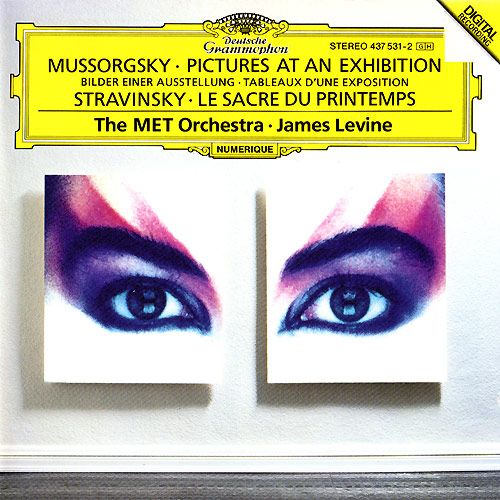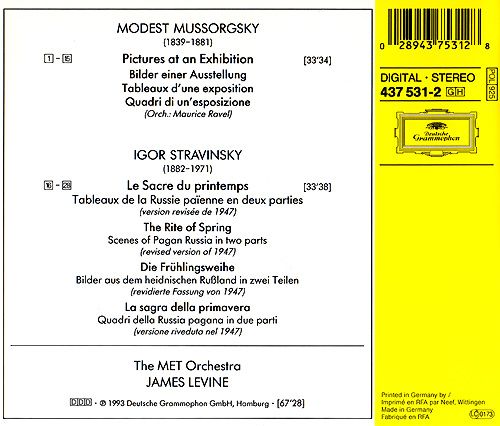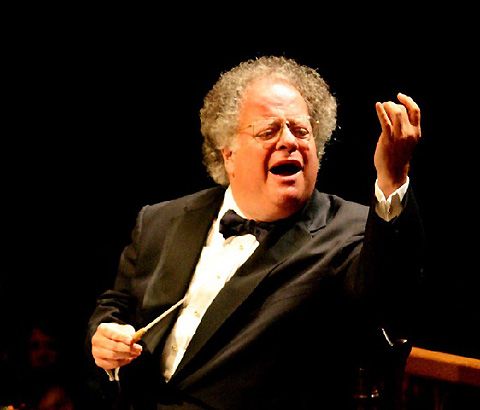wimpel69
11-29-2014, 01:19 PM
EAC-FLAC link below. This is my own rip. Complete artwork,
LOG and CUE files included. Do not share. Buy the original!
Please leave a "Like" or "Thank you" if you enjoyed this!
Conductor and pianist James Levine is one of the powerhouse figures of the classical music scene today.
As a child he undertook both piano and the violin; he was so accomplished on the violin that at the age
of ten he played Mendelssohn's second violin concerto at a Cincinnati Symphony Orchestra youth concert.
He studied piano at various summer music festivals before enrolling at New York's Juilliard School, where
he took conducting courses with Jean Morel and continued piano studies with Rosina Lhevinne. Further
conducting studies included work at the Aspen Music Festival and with the American Conductors Project,
a program run by the Baltimore Symphony Orchestra, after his Juilliard graduation in 1964.
George Szell of the Cleveland Orchestra then invited him to become an apprentice. At the conclusion
of this term, he became an assistant conductor of the orchestra from 1965 to 1970. In 1973 he
became the music director of both the Ravinia Festival (the Chicago Symphony's summer series)
and of the Cincinnati May Festival. His debut with the Metropolitan Opera Company of New York
also came in a summer festival appearance; on June 5, 1971, he conducted Puccini's Tosca.
In 1973, following the sudden departure of music director Rafael Kubelik over artistic differences,
the Metropolitan Opera appointed Levine its principal conductor. In 1975 the position was
redesignated "music director." Although Kubelik was the first conductor ever to have been given
that title at the Metropolitan, he did not remain there long enough to actually exercise the wide
responsibilities it implies; Levine was effectively the first music director of the Met. In 1986 his
position was further expanded to "artistic director," which implies control over all aspects of the
stage presentation, not just the music.
Levine's tenure at the Metropolitan has been one of the longest such associations between an
opera company and its chief conductor, providing the company with one of its greatest and
most stable periods. His season planning has been outstanding, and the Metropolitan Opera
Orchestra owes its reputation as a world-class ensemble to his leadership.
He began in 1975 to appear regularly at the Salzburg Festival in Austria, where his
performances of Mozart were highly esteemed, and proved himself an excellent Wagnerian
in his appearances at the Bayreuth Festival beginning in 1982. However, his guest conducting
availability has been limited: he considers the artistic leadership of the Metropolitan to be
a full-time, year-round job. When time allows, he performs as a pianist in chamber music
and as an accompanist for singers.
Levine commands a wide repertoire in opera and also in the concert hall, ranging from
Bach, Haydn, and Mozart to Iannis Xenakis. He is known for an open and engaging
personality which appears in his rehearsals as well, but this does not prevent him from
conducting them with businesslike efficiency. In 1996 the Metropolitan conducted a
televised celebration of 25th anniversary of Levine's first performance there in the form
of a gala. So many singers agreed to appear that the event lasted over eight hours --
conducted entirely by Levine. He has produced a large number of recordings with the
Metropolitan Opera and other opera houses, as well as orchestral recordings with the
Chicago Symphony and other great orchestras. He is also noted as a pianist who has
accompanied many of the world's top vocalists and participated in several chamber
music recordings. In 2004, Levine became music director of the Boston Symphony
Orchestra.

Music Composed by
Modest Mussorgsky
Igor Stravinsky
Played by
The MET Orchestra
Conducted by
James Levine

"Pictures at an Exhibition and The Rite of Spring make an intriguing coupling. When the
Berlin Philharmonic under Karajan recorded the two together in the Sixties, Stravinsky
doubted that the orchestra could happily accommodate what he saw as different traditions.
Yet there is an opposite case, implicitly made here by Levine and the MET Orchestra, which
sees a continuity between Mussorgsky�s and Stravinsky�s musical tableaux: both tap
into an idea of a pre-literate Russia; they share a certain emotional detachment, for all
The Rite�s kinetic fury; and one can perhaps detect something of Stravinsky�s rhythmic
audaciousness in the �Gnomus� and �Baba-Yaga� sections of Pictures. Levine�s approach
to both works is typically warm and expansive: this is a showcase recording for the
MET Orchestra, and Levine gives the players ample space to demonstrate their
prowess, with Ravel�s resplendent orchestration of Pictures a fitting vehicle. Levine
also draws out the rich melodic idiom of The Rite of Spring, to such an extent that
one wonders what that famous Parisian audience in 1913 found so horrifying."
BBC Music Magazine

Download Link - https://mega.co.nz/#!qIgjlagR!P8D2w9oCo-O0MMmHWOOl5TnMhAzl7lS_ly9hWpVXEuw
Source: Deutsche Grammophon, 1993 (my rip!)
Format: FLAC(RAR), DDD Stereo, Level: -5
File Size: 334 MB (incl. artwork, booklet, log & cue)
Enjoy! Don't share! Buy the origina! Please leave a "Like" or "Thank you" if you enjoyed this! :)
LOG and CUE files included. Do not share. Buy the original!
Please leave a "Like" or "Thank you" if you enjoyed this!
Conductor and pianist James Levine is one of the powerhouse figures of the classical music scene today.
As a child he undertook both piano and the violin; he was so accomplished on the violin that at the age
of ten he played Mendelssohn's second violin concerto at a Cincinnati Symphony Orchestra youth concert.
He studied piano at various summer music festivals before enrolling at New York's Juilliard School, where
he took conducting courses with Jean Morel and continued piano studies with Rosina Lhevinne. Further
conducting studies included work at the Aspen Music Festival and with the American Conductors Project,
a program run by the Baltimore Symphony Orchestra, after his Juilliard graduation in 1964.
George Szell of the Cleveland Orchestra then invited him to become an apprentice. At the conclusion
of this term, he became an assistant conductor of the orchestra from 1965 to 1970. In 1973 he
became the music director of both the Ravinia Festival (the Chicago Symphony's summer series)
and of the Cincinnati May Festival. His debut with the Metropolitan Opera Company of New York
also came in a summer festival appearance; on June 5, 1971, he conducted Puccini's Tosca.
In 1973, following the sudden departure of music director Rafael Kubelik over artistic differences,
the Metropolitan Opera appointed Levine its principal conductor. In 1975 the position was
redesignated "music director." Although Kubelik was the first conductor ever to have been given
that title at the Metropolitan, he did not remain there long enough to actually exercise the wide
responsibilities it implies; Levine was effectively the first music director of the Met. In 1986 his
position was further expanded to "artistic director," which implies control over all aspects of the
stage presentation, not just the music.
Levine's tenure at the Metropolitan has been one of the longest such associations between an
opera company and its chief conductor, providing the company with one of its greatest and
most stable periods. His season planning has been outstanding, and the Metropolitan Opera
Orchestra owes its reputation as a world-class ensemble to his leadership.
He began in 1975 to appear regularly at the Salzburg Festival in Austria, where his
performances of Mozart were highly esteemed, and proved himself an excellent Wagnerian
in his appearances at the Bayreuth Festival beginning in 1982. However, his guest conducting
availability has been limited: he considers the artistic leadership of the Metropolitan to be
a full-time, year-round job. When time allows, he performs as a pianist in chamber music
and as an accompanist for singers.
Levine commands a wide repertoire in opera and also in the concert hall, ranging from
Bach, Haydn, and Mozart to Iannis Xenakis. He is known for an open and engaging
personality which appears in his rehearsals as well, but this does not prevent him from
conducting them with businesslike efficiency. In 1996 the Metropolitan conducted a
televised celebration of 25th anniversary of Levine's first performance there in the form
of a gala. So many singers agreed to appear that the event lasted over eight hours --
conducted entirely by Levine. He has produced a large number of recordings with the
Metropolitan Opera and other opera houses, as well as orchestral recordings with the
Chicago Symphony and other great orchestras. He is also noted as a pianist who has
accompanied many of the world's top vocalists and participated in several chamber
music recordings. In 2004, Levine became music director of the Boston Symphony
Orchestra.

Music Composed by
Modest Mussorgsky
Igor Stravinsky
Played by
The MET Orchestra
Conducted by
James Levine

"Pictures at an Exhibition and The Rite of Spring make an intriguing coupling. When the
Berlin Philharmonic under Karajan recorded the two together in the Sixties, Stravinsky
doubted that the orchestra could happily accommodate what he saw as different traditions.
Yet there is an opposite case, implicitly made here by Levine and the MET Orchestra, which
sees a continuity between Mussorgsky�s and Stravinsky�s musical tableaux: both tap
into an idea of a pre-literate Russia; they share a certain emotional detachment, for all
The Rite�s kinetic fury; and one can perhaps detect something of Stravinsky�s rhythmic
audaciousness in the �Gnomus� and �Baba-Yaga� sections of Pictures. Levine�s approach
to both works is typically warm and expansive: this is a showcase recording for the
MET Orchestra, and Levine gives the players ample space to demonstrate their
prowess, with Ravel�s resplendent orchestration of Pictures a fitting vehicle. Levine
also draws out the rich melodic idiom of The Rite of Spring, to such an extent that
one wonders what that famous Parisian audience in 1913 found so horrifying."
BBC Music Magazine

Download Link - https://mega.co.nz/#!qIgjlagR!P8D2w9oCo-O0MMmHWOOl5TnMhAzl7lS_ly9hWpVXEuw
Source: Deutsche Grammophon, 1993 (my rip!)
Format: FLAC(RAR), DDD Stereo, Level: -5
File Size: 334 MB (incl. artwork, booklet, log & cue)
Enjoy! Don't share! Buy the origina! Please leave a "Like" or "Thank you" if you enjoyed this! :)